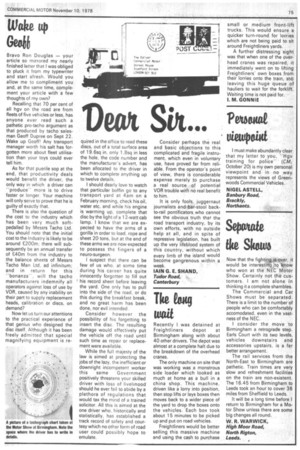Waite up Geeli
Page 79

If you've noticed an error in this article please click here to report it so we can fix it.
Bravo Ron Douglas — your article so mirrored my nearly finished letter that I was obliged to pluck it from my typewriter and start afresh. Would you allow me to compliment you and, at the same time, complement your article with a few thoughts of my own?
Recalling that 70 per cent of all hgv on the road are from fleets of five vehicles or less, has anyone ever read such a pathetic pro-tacho argument as that produced by tacho sales man Geoff Dupree on Sept 22, Wake up Geoff! Any transport manager worth his salt has forgotten more about fleet utilisation than your toys could ever tell him.
As for that puerile sop at the end, that productivity deals would benefit the driver, the only way in which a driver can "produce" more is to drive faster or longer. Your machine will only serve to prove that he is guilty of exactly that.
There is also the question of the cost to the industry which has been very much soft pedalled by Messrs Tacho Ltd. You should note that the initial cost to the Industry is likely to be around £200m; there will subsequently be an annual transfer of £40m from the industry to the balance sheets of Messrs Tacho Man Ltd, ad infinitum; and in return for this "bonanza", will the tacho manufacturers indemnify all operators against loss of use by VOR, caused by any inability on their part to supply replacement heads, calibration or discs, on demand?
Now let us turn our attentions to the practical experience of that genius who designed the disc itself. Although it has been freely admitted that special magnifying equipment is re quired in the office to read these discs, out of a total surface area of 19.6sq in, only 1.8sq in less the hole, the code number and the manufacturer's advert, has been allocated to the driver in which to complete anything up to twelve details.
I should dearly love to watch that particular boffin go to any transport yard at 4am on a February morning, check his oil, water etc, and while his engine is warming up, complete that disc by the light of a 12-watt cab lamp. I know that we are expected to have the arms of a gorilla in order to load, rope and sheet 20 tons, but at the end of these arms we are now expected to possess the fingers of a neuro-surgeon.
I suspect that there can be few of us who, at some time during his career has quite innocently forgotten to fill out his record sheet before leaving the yard. One only has to pull into the side of the road, or do this during the breakfast break, and no great harm has been done, nor evil intended.
Consider however the possibility of his forgetting to insert the disc. The resulting damage would effectively put the vehicle off the road until such time as repair or replacement were available.
While the full majesty of the law is aimed at protecting the jobs of the lazy, the inefficient or downright incompetent worker this same Government positively threatens your skilled driver with loss of livelmood should he ever fail to abide by a plethora of regulations that would tax the mind of a trained solicitor. All this is aimed at the one driver who, historically and statistically, has established a track record of safety and courtesy which no other form of road user could possibly hope to emulate. Consider perhaps the real and basic objections to this complicated and fragile instrument, which even in voluntary use, have proved far from reliable. From the operator's point of view, there is considerable expense merely to purchase a real source of potential VOR trouble with no real benefit to him.
It is only fools, juggernaut journalists and bar-stool backto-rail pontificators who cannot see the obvious truth that the road transport industry, by its own efforts, with no outside help at all, and in spite of repressive legislation, has built up the very lifeblood system of this country, without which every limb of the island would become gangrenous within a week.
IAIN G. E. SHAND.
Tudor Road, Canterbury






















































































































































